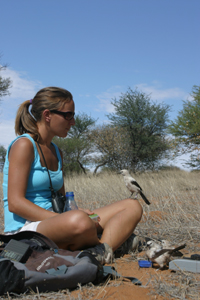UCT's conservation biology research number one in South
26 May 2008 |
| Top-flight work: Quinton Hagens and doctoral student Genevieve Jones of UCT's Percy FitzPatrick Institute at work with a Wandering Albatross on Marion Island; and, right, doctoral student Nikki Raihani with a Pied Babbler in the Kalahari, Northern Cape. |
UCT's international stature is shining after a University of Pretoria academic's survey ranked the university top among the Southern Hemisphere universities in terms of impact of research into conservation.
Dr Elissa Cameron's survey included English-speaking universities in South Africa, Australia and New Zealand, and followed a similar study of 315 institutions in North America.
Impressively, UCT scored the same as the fourth-highest North American university, UC Santa Cruz, outranking heavyweights like Stanford, Harvard and Berkeley.
"Our universities are often overlooked internationally but are actually very productive in making major research contributions," Cameron said. "I think it helps our students to know that they are working with world-leading researchers."
Cameron, who recently returned to South Africa from the US, is an associate professor and director of the Mammal Research Institute at Pretoria University.
Rankings were based on the h-index of papers published in six top conservation journals between 2000 and 2005. The h-index incorporates both the number of publications and their impact. UCT ranked third in terms of qualifying publications and was second for the number of citations.
"The h-index is a combination of publications and citations of those publications. It's supposed to represent an index not only of productivity but also of the relevance of the publications".

Fourteen of the 36 Southern Hemisphere universities that qualified for the survey had scores equal to the top 40 North American institutions. Of these, 10 were Australian, one from New Zealand, and three South African (UCT ranked first, Nelson Mandela Metropolitan University 10th and Pretoria 13th).
"We should have international recognition for our research contributions, and recognition that we are as productive as the top US universities is important for our international profile," Cameron added.
"Of course, in SA - although not in New Zealand or Australia - our research productivity is linked to National Research Foundation subsidies, so that is another benefit.
"We generally work with less funding than in the US, so I think our productivity is even more phenomenal."
Although there is no formal conservation focus at UCT, the Percy FitzPatrick Institute of African Ornithology (Department of Zoology) and the Plant Conservation Unit (Department of Botany) both have strong conservation mandates.
"With local and international teaching and student supervision, the FitzPatrick Institute runs a highly successful coursework master's programme in conservation biology that has graduated almost 200 students from 34 countries since its inception," the FitzPatrick Institute's Associate Professor Phil Hockey said.
"The fact that students are required to produce a paper suitable for publication rather than a dissertation from their independent research project doubtless contributes to UCT's international success in the conservation field."
 This work is licensed under a Creative Commons Attribution-NoDerivatives 4.0 International License.
This work is licensed under a Creative Commons Attribution-NoDerivatives 4.0 International License.
Please view the republishing articles page for more information.










